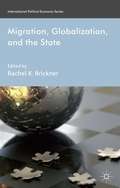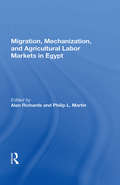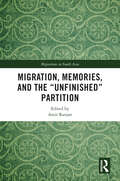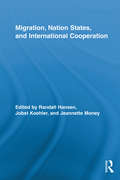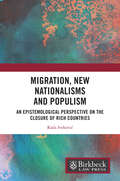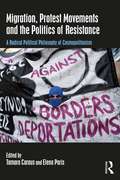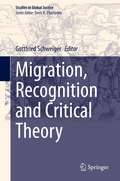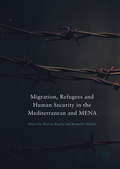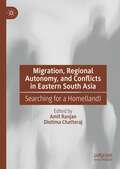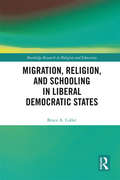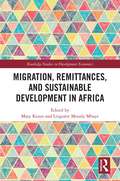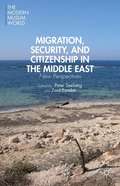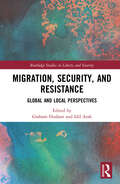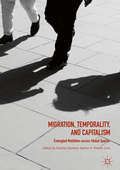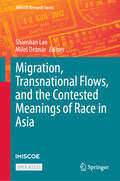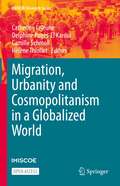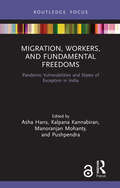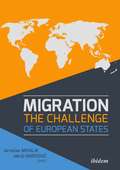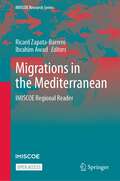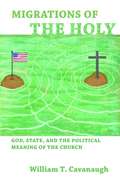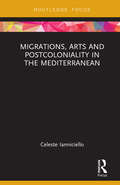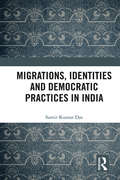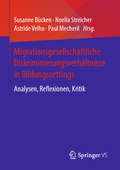- Table View
- List View
Migration, Globalization, and the State
by Rachel K. BricknerDrawing evidence from North and South America, Europe, Asia, and the Middle East, the contributors illustrate that even within the common framework of economic globalization, the ways in which the interests of state actors and the agency of migrants intersects continuously shapes and reshapes both home and destination societies.
Migration, Mechanization, And Agricultural Labor Markets In Egypt
by Alan Richards Philip L. MartinAfter a long period of stability, Egypt’s agricultural sector experienced sudden change due to the 1973 oil price increases and Anwar Sadat’s Open Door economic policies. Workers left rural Egypt for the cities and high-wage jobs in the oil-exporting countries. The resulting “labor shortage†and rising real wages in agriculture coincided with a
Migration, Memories, and the "Unfinished" Partition (Migrations in South Asia)
by Amit RanjanThis book looks at migration through the lens of the Partition of India in 1947. The Partition uprooted millions of people from their homelands. This volume examines the initial difficulties faced by the refugees in settling down in their adopted land. It analyses the state’s efforts in facilitating the movement of refugees, the processes it initiated to resettle them after Partition, and the extent to which it was successful. This book also investigates the links between socio-political developments in contemporary India, Pakistan, and Bangladesh as a result of the Partition.Drawing on archival sources, oral histories and literary representations, the contributing authors discuss and analyse the experiences of the migrated population. Part of the Migrations in South Asia series, this book will be an important read for scholars and researchers of migration studies, refugee studies, Partition studies, Indian history, Indian politics, and South Asian studies.
Migration, Nation States, and International Cooperation (Routledge Research in Transnationalism)
by Randall Hansen, Jobst Koehler, and Jeannette MoneyAgainst a background of past, limited examples of international cooperation, and ambitious hopes for extensive future efforts, this volume puts two related questions to the empirical test: under which conditions are states prepared to cooperate over international migration, and what form - bilateral, multilateral, formal, informal - will this cooperation take?
Migration, New Nationalisms and Populism: An Epistemological Perspective on the Closure of Rich Countries
by Rada IvekovicThis book examines the antagonistic relationship between new European nationalisms as these often go hand-in-hand with populism, and the phenomenon of migration. Migration has become a significant issue both in Europe and the whole world. Although it has always existed, much of public opinion sees it now as a problem. The latter has been exaggerated through a crisis in hospitality exacerbated by the relatively recently constructed and misplaced feeling of a civilisational threat from islam. Migration is then countered by the escalation of new nationalisms, at least some of which are supported by populism. This book offers an understanding of this conjunction of migration and nationalism in the post-cold war European context. More specifically, the book takes up how the end of the simplified cold war cognitive binary means an unprecedented epistemological confusion and depoliticisation which takes migration as its target, but could resort to other targets too. Discussing the postcolonial background to the new migrations, the book also considers womens' rights, postsocialism and the relevance of the current pandemic, as the issue of migration is addressed in the context of the European crisis-ridden present. This wide-ranging interrogation of how contemporary European migration is conceived and understood will appeal to students, academics, activists, policy makers, and others with interests in contemporary migration, new nationalisms, populism, feminism, colonial, postcolonial, and decolonial issues, as well as socialism and postsocialism.
Migration, Protest Movements and the Politics of Resistance: A Radical Political Philosophy of Cosmopolitanism
by Tamara Caraus Elena ParisMigration and cosmopolitanism are said to be complementary. Cosmopolitanism means to be a citizen of the world, and migration, without impediments, should be the natural starting point for a cosmopolitan view. However, the intensification of migration, through an increasing number of refugees and economic migrants, has generated anti-cosmopolitan stances. Using the concept of cosmopolitanism as it emerges from migrant protests like Sans Papiers, No One Is Illegal, and No Borders, an interdisciplinary group of scholars addresses this discrepancy and explores how migrant protest movements elicit a new form of radical cosmopolitanism. The combination of basic theoretical concepts and detailed empirical analysis in this book will advance the theoretical debate on the inherent cosmopolitan aspects of migrant activism. As such, it will be a valuable contribution to students, researchers and scholars of political science, sociology and philosophy.
Migration, Recognition and Critical Theory (Studies in Global Justice #21)
by Gottfried SchweigerThis book brings together philosophical, social-theoretical and empirically oriented contributions on the philosophical and socio-theoretical debate on migration and integration, using the instruments of recognition as a normative and social-scientific category. Furthermore, the theoretical and practical implications of recognition theory are reflected through the case of migration. Migration movements, refugees and the associated tensions are phenomena that have become the focus of scientific, political and public debate in recent years. Migrants, in particular refugees, face many injustices and are especially vulnerable, but the right-wing political discourse presents them as threats to social order and stability. This book shows what a critical theory of recognition can contribute to the debate. The book is suitable for researchers in philosophy, social theory and migration research. "A profound examination of how states and societies struggle to recognize migrants as fellow human beings in all their fullness. The contributions are exceptional for combining astute philosophy and social theory with a discussion of actual politics and real lives."Dr. Hugo Slim(Senior Research Fellow at the Blavatnik School of Government, University of Oxford and formerly Head of Policy at the International Committee of the Red Cross) “This impressive and timely volume offers an innovative way of understanding the issues of migration and integration by using a critical theory of recognition. Recognition theory has rich potential for effectively responding to the issues of autonomy, identity, integration, and empowerment that are at the core of the current public debates on mass migration, displacement, and the refugee crisis. By examining the normative and policy implications of recognition as they apply to migration, the book offers a pathbreaking look at the human dimension of the debate.”Dr. Helle Porsdam(Professor of Law and Humanities and UNESCO Chair in Cultural Rights University of Copenhagen)
Migration, Refugees and Human Security in the Mediterranean and MENA
by Kenneth Christie Marion BoulbyThis book focuses on the Mediterranean/MENA migration crisis and explores the human security implications for migrants and refugees in this troubled region. Since the Arab uprisings of 2010/2011, the Middle East and North Africa region has experienced major political transformations and called into question the legitimacy of states in the region. Displaced populations continue to suffer due to the major conflicts in Syria, Iraq and elsewhere, causing fragmentation and dis-integration of communities. Contributors to this volume analyze how and why this crisis differs significantly from previous migration/refugee flows in the region, explain the historical and political antecedents of this crisis which have played a part in its shaping, and explore the relationship between human security and the protection of vulnerable individuals and groups.
Migration, Regional Autonomy, and Conflicts in Eastern South Asia: Searching for a Home(land)
by Amit Ranjan Diotima ChattorajDelving into the past and present of various secessionist movements in Northeast India, political conflict in Chittagong Hill Tracts in Bangladesh, a political movement for autonomy in Darjeeling hills in Eastern India, and the Rohingya migration crisis affecting India and Bangladesh, this book examines the volatile co-existence of competing population groups in Eastern South Asia. Through the conceptual lens of the ‘home’ and feeling of ‘homeland’ in Eastern South Asia, the authors seek answers to three complex but interrelated questions: why is Eastern South Asia facing so many political movements and conflicts? How have the political movements affected the region and people? Why is the number of migrants in this region so high? Answers to these questions are vital to those studying South Asia and interested in understanding this region.
Migration, Religion, and Schooling in Liberal Democratic States (Routledge Research in Religion and Education)
by Bruce A. ColletSpeaking to an increasingly fluid world involving the migration of peoples and cultures, the global resilience of religion, and the role of schooling in fostering liberal democratic values, this book investigates the degree to which secular public schools might facilitate religious migrants’ societal integration. Adopting a multidisciplinary approach which draws from political philosophy, the philosophy of education, and the sociology of religion, Collet argues that public schools in liberal democratic states can best facilitate the pluralistic integration of religious migrant students through adopting policies of recognition and accommodation that are not only reasonable in the light of liberal democratic principles, but also informed in terms of what we understand regarding the natural role religion often plays in acculturation.
Migration, Remittances, And Small Business Development: Mexico And Caribbean Basin Countries
by Sidney Weintraub Sergio Díaz-Briquets"The Immigration Reform and Control Act of 1986 (IRCA) was a manifestation of widespread public concern over the volume of undocumented immigration into the United States. The principal innovation of this legislation-the provision to impose penalties on employers who knowingly hire undocumented immigrants-was a response to this concern. This effort at restriction was tempered in IRCA by other provisions permitting the legalization of two types of undocumented immigrantsthose who had resided in the United States since January 1, 1982; and what were called special agricultural workers (SAWs), persons who had worked in perishable crop agriculture for at least 90 days during specified periods from 1983 to 1986. Approximately 3.1 million persons sought legalization (what is popularly referred to as amnesty) under these two provisions. The breakdown was roughly 1.8 million under the regular program and 1.3 million as SAWs. Mexicans made up 75 percent of the combined legalization requests."
Migration, Remittances, and Sustainable Development in Africa (Routledge Studies in Development Economics)
by Maty Konte Linguère Mously MbayeThis book provides a strong multidisciplinary examination of the links between migration, remittances and sustainable development in Africa. It makes evidence-based policy recommendations on migration to help achieve the Sustainable Development Goals. The key themes examined are migration and remittances, and their relations with the following issues: economic transformation, education and knowledge, corruption and conflict. Cross-cutting issues such as gender equality and youth are weaved throughout the chapters, and a rich range of country contexts are presented. The volume also discusses challenges in managing migration flows. It will be of interest to advanced students, academics and policy makers in development economics and sustainable development.
Migration, Security, And Citizenship In The Middle East
by Peter Seeberg Zaid EyadatThis volume addresses new tendencies related to migration from a Middle Eastern and Mediterranean perspective and with an emphasis on security and citizenship. Contributors aim not only to intervene in scholarly debates surrounding citizenship and migration but also to contribute to policy-oriented discussions related to migration.
Migration, Security, and Resistance: Global and Local Perspectives (Routledge Studies in Liberty and Security)
by Graham HudsonThis volume explores the digitization, privatization, and spatial displacement of border security and the effects these have on political accountability and migrant rights. The governance of security and migration is unfolding in new political spaces. Cooperation and competition among immigration officials, border guards, transnational security corporations, IT companies, local police, and international organizations has decoupled migration governance from national political structures. The chapters in the volume examine how these dynamics affect the deployment and constraint of sovereign power in the United States, Canada, the United Kingdom, and the EU. Contributors trace this process from the disciplinary perspectives of law, political science, sociology, criminology, and geography. Part I of the book explores the reconfiguration of security and migration governance through historical processes of privatization, digitization, and the rescaling of border control technologies to local and global spaces. Part II explores how migrant rights actors have responded by rescaling resistance to global and local levels. This book will be of much interest to students of critical security studies, global governance, migration studies, and international relations.
Migration, Temporality, and Capitalism: Entangled Mobilities Across Global Spaces
by Winnie Lem Pauline Gardiner BarberBringing together a range of illustrative case studies coupled with fresh theoretical insights, this volume is one of the first to address the complexities and contradictions in the relationship between migration, time, and capitalism. While temporal reckoning has long fascinated anthropologists, few studies have sought to confront how capitalism fetishizes time in the production of global inequalities—historically and in the contemporary world. As it explores how the agendas of capitalism condition migration in Europe, North America, and Oceania, this collection also examines temporality as a feature of migrants’ experiences to ultimately provide a theoretically robust and ethnographically informed investigation of migration and temporality within a framework defined by the political economy of capitalism.
Migration, Transnational Flows, and the Contested Meanings of Race in Asia (IMISCOE Research Series)
by Shanshan Lan Miloš DebnárThis open access edited volume addresses the multi-layered relations between migration, transnational flows, and the contested meanings of race in Asia. It tries to answer the following questions: how do migration and transnational flows from the Western world impact racial knowledge formation in Asian societies? To what extent do they challenge, perpetuate, and reshape unequal power relations based on the intersection of race, gender, class, nationality, citizenship, and migration status in Asia? How are dominant Western racial categories such as race, whiteness, and blackness redefined and reconstructed in the context of the Covid-19 pandemic, when transnational mobility became both heavily restricted and stigmatized ? The book is divided into three parts: Race, Language and Migration status, Covid-19 and the Dynamics of Racialization, Gender and Interracial Encounters. This book positions itself in the nexus of race, migration and pandemic research and will make a significant contribution to critical race studies, whiteness studies, globalization, multiculturalism, and social transformation in Asia. This book is aimed at students and scholars in race and migration studies in Asia and beyond. This is an open access book.
Migration, Urbanity and Cosmopolitanism in a Globalized World (IMISCOE Research Series)
by Catherine Lejeune Delphine Pagès-El Karoui Camille Schmoll Hélène ThiolletThis open access book draws a theoretically productive triangle between urban studies, theories of cosmopolitanism, and migration studies in a global context. It provides a unique, encompassing and situated view on the various relations between cosmopolitanism and urbanity in the contemporary world. Drawing on a variety of cities in Latin America, Europe, Asia, Africa and North America, it overcomes the Eurocentric bias that has marked debate on cosmopolitanism from its inception. The contributions highlight the crucial role of migrants as actors of urban change and targets of urban policies, thus reconciling empirical and normative approaches to cosmopolitanism. By addressing issues such as cosmopolitanism and urban geographies of power, locations and temporalities of subaltern cosmopolites, political meanings and effects of cosmopolitan practices and discourses in urban contexts, it revisits contemporary debates on superdiversity, urban stratification and local incorporation, and assess the role of migration and mobility in globalization and social change.
Migration, Workers, and Fundamental Freedoms: Pandemic Vulnerabilities and States of Exception in India
by Kalpana Kannabiran Manoranjan Mohanty Asha HansThe COVID-19 pandemic resulted in a mass exodus of India’s migrant workers from the cities back to the villages. This book explores the social conditions and concerns around health, labour, migration, and gender that were thrown up as a result of this forced migration.The book examines the failings of the public health systems and the state response to address the humanitarian crisis which unfolded in the middle of the pandemic. It highlights how the pandemic-lockdown disproportionately affected marginalised social groups – Dalits and the Adivasi communities, women and Muslim workers. The book reflects on the socio-economic vulnerabilities of migrant workers, their rights to dignity, questions around citizenship, and the need for robust systems of democratic and constitutional accountability. The chapters also critically look at the gendered vulnerabilities of women and non-cis persons in both public and private spaces, the exacerbation of social stratification and prejudices, incidents of intimidation by the administration and the police forces, and proposed labour reforms which might create greater insecurities for migrant workers.This important and timely book will be of great interest to researchers and students of sociology, public policy, development studies, gender studies, labour and economics, and law.
Migration, Workers, and Fundamental Freedoms: Pandemic Vulnerabilities and States of Exception in India
by Asha Hans, Kalpana Kannabiran, Manoranjan Mohanty, and PushpendraThe COVID-19 pandemic resulted in a mass exodus of India’s migrant workers from the cities back to the villages. This book explores the social conditions and concerns around health, labour, migration, and gender that were thrown up as a result of this forced migration. The book examines the failings of the public health systems and the state response to address the humanitarian crisis which unfolded in the middle of the pandemic. It highlights how the pandemic-lockdown disproportionately affected marginalised social groups – Dalits and the Adivasi communities, women and Muslim workers. The book reflects on the socio-economic vulnerabilities of migrant workers, their rights to dignity, questions around citizenship, and the need for robust systems of democratic and constitutional accountability. The chapters also critically look at the gendered vulnerabilities of women and non-cis persons in both public and private spaces, the exacerbation of social stratification and prejudices, incidents of intimidation by the administration and the police forces, and proposed labour reforms which might create greater insecurities for migrant workers. This important and timely book will be of great interest to researchers and students of sociology, public policy, development studies, gender studies, labour and economics, and law.
Migration: The Challenge of European States
by Jaroslav MihalikIn the United States as well as in Europe, migration and migration policy are one of the top issues. This timely volume gathers distinguished authors from academic institutions throughout Europe, addressing the growing importance of migration policy making and the refugee crisis that European Union member states and other countries are currently facing. By focusing on the most important effects that the migration from Third World countries has brought to the European Union, they provide a critical overview of the politicization, securitization, and social discourse of migration. The authors analyze the effects on public administration and governance and also discuss the rise of the radical right in EU member states, the rise of populism, and the alienation of citizens from formal politics which is also caused by the growing interest in security and public safety. The pan-European character of the publication’s scope is vested in its narration; the contributors cover the situation in Western Europe, the critical positions of the Visegrad countries as well as foreign policy making in Slovenia and the Western Balkans. Moreover, the authors address case studies from states such as Armenia and Moldova, including their labor migrants in the Western world. The collection is completed by contrasting and discussing the immigration policies of countries that are well-known for their open and liberal immigration activities such as Australia, Canada, New Zealand, and the United States.
Migrations in the Mediterranean: IMISCOE Regional Reader (IMISCOE Research Series)
by Ricard Zapata-Barrero Ibrahim AwadThis open access Regional Reader describes population movement circulating within the Mediterranean area, for any reason or from any region, be them European, African, Asian or originating from any of the Mediterranean shores. It showcases a plurality of approaches to and applications of Mediterranean migration, contributing to a regional approach to migration studies, thereby defending this regional approach by scaling Mediterranean migration issues. This book covers a large set of questions related Mediterranean migrations to the migration research agenda, such as: market and economy, politics and policies, super-diversity and intersectionality, media, society, welfare and the environment through five main parts: Geo-political Mediterranean Relations, Governance, Policies and Politics, Mobility drivers and Agency, Cities, History and Social Transformations, and Economy and Labour Markets. This Regional Reader provides an interesting read to scholars, researchers, but also policy makers and civil society organizations’ high representatives, international foundations and institutions interested in linking the Mediterranean and migration.
Migrations of the Holy: God, State, and the Political Meaning of the Church
by William T. CavanaughWhether one thinks that "religion" continues to fade or has made a comeback in the contemporary world, there is a common notion that "religion" went away somewhere, at least in the West. But William Cavanaugh argues that religious fervor never left -- it has only migrated toward a new object of worship. In Migrations of the Holy he examines the disconcerting modern transfer of sacred devotion from the church to the nation-state. In these chapters Cavanaugh cautions readers to be wary of a rigid separation of religion and politics that boxes in the church and sends citizens instead to the state for hope, comfort, and salvation as they navigate the risks and pains of mortal life. When nationality becomes the primary source of identity and belonging, he warns, the state becomes the god and idol of its own religion, the language of nationalism becomes a liturgy, and devotees willingly sacrifice their lives to serve and defend their country. Cavanaugh urges Christians to resist this form of idolatry, to unthink the inevitability of the nation-state and its dreary party politics, to embrace radical forms of political pluralism that privilege local communities -- and to cling to an incarnational theology that weaves itself seamlessly and tangibly into all aspects of daily life and culture.
Migrations, Arts and Postcoloniality in the Mediterranean (Routledge Focus on Art History and Visual Studies)
by Celeste IannicielloThis book is focused on the transcultural memory of the Mediterranean region and the different ways it is articulated by contemporary art practices and museum projects linked to migrations, exile, diaspora and transnationality. The artistic and curatorial examples analysed in this study articulate a critical relationship between the cultural representations and the sense of heritage, property and belonging, offering the opportunity of a more problematic and stimulating vision of the preservation of the European arts, traditions and histories. Artists and projects examined include the project Porto M in Lampedusa, Zineb Sedira, Ursula Biemann, Lara Baladi, Mona Hatoum, Emily Jacir, Kader Attia and Walid Raad.
Migrations, Identities and Democratic Practices in India
by Samir Kumar DasThis book explores contesting identities, international politics, migration and democratic practices in the context of globalizing India. Drawing on extensive ethnographic research, it looks at one of the oldest migratory routes across a volatile region in eastern India which is fraught with violent claims of separate statehood. The book offers an account of how the ‘North Bengal’ region has acted as a gateway to migrant populations over time and points to why it must be understood as a shifting and liminal space through a study of Bodoland, Gorkhaland, Kamatapuri, Siliguri and the Greater Cooch Behar movements. It shows the region’s politics of identity or quest for homeland not as a means of compensating for the lack or absence of identity, but as an everyday practice of living that very absence, across borders and boundaries, without arriving at any definitive and stable identity, along with impacts and manifestations in democratic political processes. A major intervention in modern political theory – shedding new light on concepts such as home and homeland, space and self, sovereignty, nation-state, freedom and democracy – this book will be of interest to scholars and researchers of political science, modern South Asian history, sociology and social anthropology, and migration and diaspora studies.
Migrationsgesellschaftliche Diskriminierungsverhältnisse in Bildungssettings: Analysen, Reflexionen, Kritik
by Paul Mecheril Susanne Bücken Noelia Streicher Astride VelhoDass in pädagogischen Zusammenhängen nicht nur das Thema Diskriminierung zum Gegenstand werden kann, sondern pädagogische Settings selbst Orte der Diskriminierung sein können, stellt den Bezugspunkt des vorliegenden Bandes dar. Mit Bezug auf diese gewissermaßen Verdopplung des Themas Diskriminierung in pädagogischen Settings werden in dem Sammelband Komplexitäten, Widersprüchlichkeiten und Verstrickungen, welche grundlegende Spannungsverhältnisse der kritischen Thematisierung migrationsgesellschaftlicher Diskriminierung betreffen, analysiert und reflektiert. Die Beiträge wenden sich dabei unterschiedlichen pädagogischen Bereichen zu.
